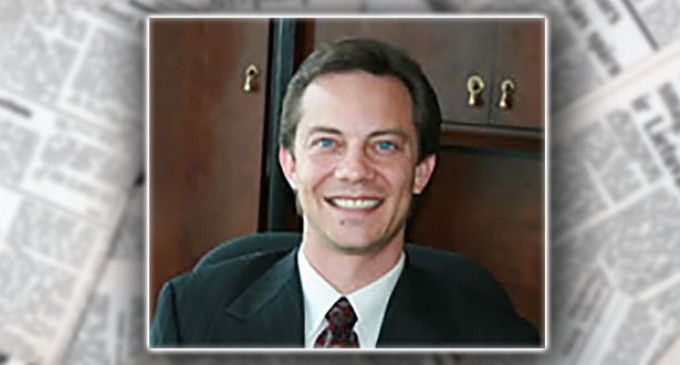Controversial estate guardian has defenders

Above: Bryan C. Thompson
Cash Michaels
Analysis
Published reports by The Chronicle since last October have proven there are many questions about the conduct of the Forsyth County Clerk of Superior Court’s office, especially when it comes to officially entering, or file-stamping, court orders into the record. The result has been a number of court challenges, including at least one lawsuit being lodged against the clerk’s office. The excuse from Forsyth Clerk Susan Frye has ranged from “It was standard practice,” to “inadvertent error.”
Neither excuse flew with the state Court of Appeals, which in February 2014 ruled that any court order not properly entered was “ … without legal authority.”
But at the center of many of these clerk’s office controversies, especially when it comes to estate guardianships, is prominent Winston-Salem attorney Bryan C. Thompson. As an appointed guardian of the estate for many of the cases the clerk’s office has handled over the past decade, Thompson has been responsible for managing the assets of those legally declared to be incompetent to ensure that their fiscal responsibilities are met.
But there have been serious questions about his work.
Winston-Salem attorney Reginald D. Alston has called some of Thompson’s work as an estate guardian into question, accusing him of “felony theft” in at least one case, and not having the legal authority to serve in others. In a lawsuit filed against Thompson last October on behalf of the estate of the late Mary Brannon Thompson (no relation), Alston accused him of squandering her $1.4 million in assets and properties, and implicated the Forsyth Clerk’s office in an alleged “pattern and practice” of fraud.
Indeed, it’s because of this lawsuit, and several other court actions by attorney Alston against Bryan Thompson and the Forsyth Clerk’s office, that defense attorney Molly Whitlatch of the Greensboro law firm of Sharpless & Stavola, and her colleague, attorney David Freedman of Crumpler, Freedman, Parke and Witt of Winston-Salem, asked The Chronicle to meet with them in Greensboro last week so that they could show what they say is evidence that attorney Thompson is not the “… robber baron filling his pockets,” as attorney Alston portrayed him to be in open court last month, but rather a caring legal professional who “… has the best interests of the people he’s represented” as estate guardian, under the direction of the Forsyth Clerk’s office.
Beyond stating flat out that attorney Thompson is innocent of any and all allegations of fraud and stealing money, Whitlatch and Freedman showed The Chronicle court documents dated from 2007 through 2014 they claim account for all of Mary Thompson’s assets and disbursements and are best evidence, they allege, against any allegations of fraud.
In her answer to the lawsuit, Whitlatch not only counterclaimed, but also asked for sanctions for “… allegations in bad faith, and for the inflammatory purposes of creating scandal…” Whitlatch went on to insist, as she did in her answer, that Mary Thompson’s assets were “used in good faith for her benefit” paying for her nursing home and medical bills prior to her death. Because some of her properties were not in good physical condition, they sold for less than tax value, Whitlatch maintained, but there was no evidence of attorney Thompson taking anything beyond his court-approved fees for managing the estate.
Several critical court orders in the case were not file-stamped, however, and the state Court of Appeals ruled that as a result, the actions of attorney Thompson were effectively “legally invalid.” Whitlatch maintains the non-file-stamping was a practice of the clerk’s office at the time, and Thompson should not be held accountable for it. An appeal is pending in that issue.
No trial date has been set for the lawsuit at press time.
In the matter of Steven Epperson, where it had been alleged that attorney Thompson took over $44,000 from that ward’s estate prior to being officially designated as estate guardian, attorney Whitlatch has always countered that Thompson did nothing wrong and every penny of that money has been accounted for since 2011, when he closed out the account and was discharged from his responsibilities as guardian.
She showed The Chronicle a new witnessed, amended receipt for the $44,000 now dated June 23, 2010, but filestamped recently on Dec. 29, 2015, to replace the original disputed Nov. 15, 2009 receipt which Whitlatch had claimed in court was a typographical error, since Thompson was not Epperson’s legal guardian until April 2010.
The money was disbursed from the estate of John Epperson, Steven’s father, and attorney Thompson served as the administrator of that estate.
In an affidavit filed from Bryan Thompson in Forsyth Superior Court last month, he claimed that the Nov. 15, 2009 receipt was in error because Epperson’s father’s estate hadn’t even gotten a $175,953.75 settlement until December 2009, meaning that there was no $44,000 for Thompson to claim as estate guardian for Steven until after he was appointed the following April 2010.
As public administrator of the late John Epperson’s estate, Thompson disbursed funds from that settlement to Steven Epperson’s siblings in February 2010, court documents show, but did not to Steven until June 2010, Thompson said in the affidavit, because he hadn’t been appointed guardian until April.
Attorney Whitlatch also showed The Chronicle court documents from Feb., 2011, where Thompson is approved to be paid $4,202.92 in commissions for managing the Steven Epperson estate, not $9,000 as had been claimed during a Dec. 16 hearing on the matter. The Chronicle did not see any evidence as to what Thompson’s fee was for serving as public administrator for the father’s estate.
Whitlatch maintained that Thompson paid all of Steven Epperson’s bills from his share of the money, in addition to disbursing money to his siblings when asked for certain needs. However Kim Epperson, in a June 1, 2010 letter to the clerk’s office, complained that the family “… does not want” Thompson to be Steven’s estate guardian “… due to the way we were treated… “
And again, critical documents were not file-stamped, calling into question the legal validity of Thompson’s management.
Of particular importance is the initial Nov. 15, 2009 receipt for the $44,000 from John Epperson’s estate, disbursed by Thompson as public administrator to the estate of son Steven, which is said to be a mistake. Both Thompson and Whitlatch claim the date was a typographical error because the funds weren’t available until a month after and weren’t actually transferred until June of the following year.
And yet the typo court document is signed by both Thompson and a witness. Because it was not file-stamped by the clerk, there is no real way to confirm whether it was signed on that date or not. Another court hearing in the matter is expected.
One thing has become clear in the midst of The Chronicle’s reporting – Bryan C. Thompson has his defenders, people who say that he does his job honestly and professionally and tries to help beleaguered families navigate their affairs in times of challenge.
Dr. Helen Pierce contacted The Chronicle several weeks ago to tell how attorney Thompson vitally helped her when her father fell ill in August 2003, and the Forsyth Clerk’s office declared her father incompetent. Her mother had passed, so Pierce, who had power of attorney, was responsible for caring for her dad. That POA was eventually revoked by the Clerk’s office after Pierce’s brother made several claims against her.
Dr. Pierce says that’s when attorney Thompson took over as estate guardian, making sure that her father’s medical bills were properly paid, his assets were effectively looked after, and her parents’ house saved, relieving Pierce of tremendous worry and problems.
So trusting did Pierce become of Thompson’s stewardship, she says, that when patients of hers also had guardianship issues, she referred them to him and he helped them, even if they couldn’t pay.
“[That’s] … not being discussed in the articles, and I think [it’s] important …,” Dr. Pierce insists.
Ultimately, whether attorney Bryan Thompson legally violated any laws is up to a judge or jury to decide. But the pattern of allegations and the admission by the Forsyth Clerk’s office that it did not follow standard legal procedure for legally entering court orders it generated into the record have left a number of legitimate questions involving the assets and property of elderly African-American Forsyth County residents that cannot be ignored.
Cash Michaels covers topics for The Chronicle.















